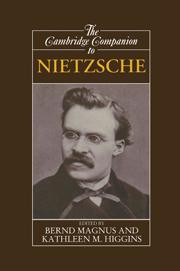Book contents
- Frontmatter
- Introduction to the Cambridge companion to Nietzsche
- Part I Introduction to Nietzsche's works
- Part II The use and abuse of Nietzsche's life and works
- 2 The hero as outsider
- 3 Nietzsche and the Judaeo-Christian tradition
- 4 Nietzsche's political misappropriation
- Part III Nietzsche as philosopher
- Part IV Nietzsche's influence
- Selected bibliography
- Index
2 - The hero as outsider
from Part II - The use and abuse of Nietzsche's life and works
Published online by Cambridge University Press: 28 May 2006
- Frontmatter
- Introduction to the Cambridge companion to Nietzsche
- Part I Introduction to Nietzsche's works
- Part II The use and abuse of Nietzsche's life and works
- 2 The hero as outsider
- 3 Nietzsche and the Judaeo-Christian tradition
- 4 Nietzsche's political misappropriation
- Part III Nietzsche as philosopher
- Part IV Nietzsche's influence
- Selected bibliography
- Index
Summary
THE NIETZSCHE LEGEND
For many years Nietzsche lived in a room in a house in Sils-Maria, in the Upper Engadine in Switzerland. The room is kept as he lived in it and it has often been photographed. It contains a bed, a writing-table with a lamp on it and a wash-table, and a small sofa. The walls are of wood, and the floorboards are partly covered with a carpet. There is a single window and through it you can see part of the village of Sils and the slopes of the mountains that lie beyond it. It is a typical small room in an Alpine village house.
He lived in this room in the summer months and would have lived in it all the year round if the winters had not been too cold for him. The winters in the Upper Engadine can be very cold.
From this room he wrote on 20 July 1888 that he had succeeded in securing a publisher for a book on the aesthetics of French drama by the Swiss author Carl Spitteler. This “little piece of humanity on my part” he said, was “my kind of revenge for an extremely tactless and impudent article by Spitteler on my entire literature” which had appeared the previous winter. He added: “I have far too high an opinion of the talent of this Swiss to let myself be disconcerted by a piece of loutishness.”
- Type
- Chapter
- Information
- The Cambridge Companion to Nietzsche , pp. 71 - 89Publisher: Cambridge University PressPrint publication year: 1996
- 2
- Cited by

